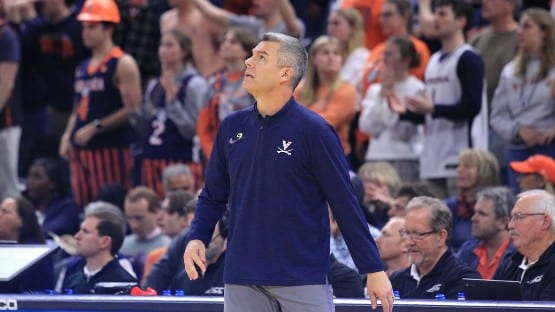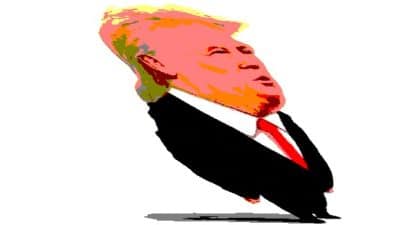
I got a text from a friend as the final couple of minutes of last night’s 74-63 Virginia loss to Pitt were playing out.
This one feels like an NCAA Tournament loss.
The way things evolved down the stretch of the game – Pitt getting separation in a one-point game by holding Virginia scoreless for more than four minutes, then going on a 10-2 run over the next 5:20 before the Cavaliers, obviously more and more frustrated with how things were going against them, made their next shot – yeah, we’ve seen this one before, and too often in March.
As in, you know, the game, slipping away, and the Virginia kids, not sure what to do.
The one drawback to Tony Bennett’s risk-averse style of play is that it isn’t conducive to dramatic late-game comebacks.
Now, yes, it’s rare that there’s even a need for his teams to have to stage a late rally, which is a testament to how Bennett makes opponents beat him playing the game the way he wants it played.
But on those rare nights when the game is out of Bennett’s control, it’s almost as if his kids aren’t sure how to react.
It’s against this backdrop that I present for analysis the Freudian slip from Bennett in his postgame presser.
As Bennett was discussing the defensive breakdowns that allowed Pitt to make a season-high 14 threes, the word “quit” came up.
“Once they hit some shots, I felt like at the end, we quit a little bit, just like we got, we got discouraged,” Bennett said. “And we got to learn from that whether we took a quick shot – when I say quit, I don’t mean, I just feel like we, we didn’t stick to what we needed to do, and then it can separate quick.”
The way Bennett moved quickly to try to correct himself regarding the use of the word “quit” is the indication here that he wasn’t being the coach trying to use the media to get a point across to his team.
That said, it’s not as if what he was talking about wasn’t something that those of us who were watching the game hadn’t seen for ourselves.
It was 52-51 Pitt after a nice backcut by Taine Murray led to a balletic layup at the 11:28 mark.
Virginia would make just one shot from the floor over the next nine-plus minutes, and while Pitt wasn’t exactly lighting it up on the other end, the Panthers were able to slowly pull away, outscoring UVA 18-5 in the stretch to build a 70-56 lead.
The final bucket in that run came on a Carlton Carrington layup with 3:02 to go.
That bucket seemed to visibly take the air out of the Virginia team.
The two players brought to the podium to talk with the media postgame acknowledged as much.
“I mean, a little bit,” senior point guard Reece Beekman said. “I feel like we got a little snagged on the offensive end, and their offense kept going. So, you know, we just got to figure out ways to stop those, you know, scoring droughts for us and, you know, clean it up on the defensive end.”
The answer from sophomore guard Isaac McKneely was more telling.
“We’re not necessarily a team that plays well from behind, because, you know, we’re not the fastest team, you know, we don’t try and, like, push in transition too much, so it’s hard whenever we get behind like that, and they’re hitting tough shots,” McKneely said.
Yeah, that’s the hammer hitting the nail on the head right there.
It’s rare, sure, as I said earlier, for a Tony Bennett team to find itself in the position it was in last night, in a deep hole, searching for answers, none making themselves immediately obvious, but actually, we’ve seen it a few times this season already, and in each case, his team didn’t respond well at all.
Think back to the double-digit losses – Wisconsin, at Memphis, at Notre Dame, at NC State, at Wake Forest.
It kind of felt like, as those games played out, Bennett’s players, unsure of what to do to launch a comeback from a deficit, let themselves get frustrated, and eventually, using Bennett’s words from his presser last night, eventually just quit.
Back to McKneely:
“So yeah, I would say, definitely, you know, sometimes when they when they hit a tough shot like that, it deflates us, like, man, like, we played good defense for 29 seconds, and then they hit a tough one at the end of a shot clock or whatever, so, sometimes, yeah, that can deflate you. But you know, we can’t let that happen. We’ve got to, you know, keep the offense and defense separate, not let, you know, them hitting shots affect our offense or affect our defense. We’ve just got to you, know, keep playing.”
Here’s Beekman chiming in:
“I think we just have to, I think we were a little separated today. You know, we’ve got to play more as a team and stay together. I feel like stretches during the game, you know, we kind of drifted apart on both sides of the ball, and that hurt us. So, you know, you’ ve just got to learn to stick together and, you know, do what we do. I feel like we had a lot of lapses on the defensive end that, you know, just caused them to have more energy throughout the game.”
I don’t know what the answer is here, except to say, from my own experience with mental health therapy, being able to acknowledge the problem out loud is an important first step.
Maybe, if this isn’t done already, having the rotation guys practice in situations where they’re down big late-game, have them simulate against the scout team what they need to do to get out of the hole, just to build some muscle memory.
The NCAA only gives you so many hours a week, I know.
It’s, just, it’s so obvious that the Virginia kids have no idea what to do, and McKneely has his finger on the pulse there as to why.
It’s probably better to have some muscle memory to refer to as opposed to figuring it out real-time.
We’ve seen the results there, and they’ve not been good.










